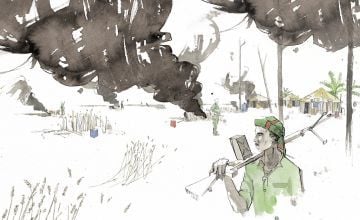
Read our 2024 annual report

Knowledge Hub
Concern Worldwide urges the public to join campaign to end conflict-driven hunger and famine

Concern Worldwide is urging the public to support its new activism campaign, launched today, which calls on global leaders to end conflict-driven hunger and famine.
“In 2021, there should be no place for famine or hunger in the world, yet it is happening, and conflict is the main driver,” Concern Worldwide Chief Executive Dominic MacSorley said.
“Over the last five years acute food insecurity – the most urgent form of hunger – has been increasing, and while COVID-19 and climate change are accelerators, the single greatest driver is conflict. There are now 41 million people facing emergency levels of hunger; that’s more than eight times the population of Ireland currently on the precipice of starvation.”
While conflict is typically associated with guns and weaponry, the Nothing Kills Like Hunger Campaign shows that in most conflicts, children are more likely to die as a result of hunger and related diseases than fighting.
“In conflict zones around the world, hunger is being deliberately weaponised by warring parties, with crops and livestock destroyed, access to markets cut off, and civilians denied access to food,” Mr MacSorley said.
“Concern Worldwide was established in 1968 to mobilise the Irish public’s response to the humanitarian crisis in Biafra, where up to two million people died of hunger in a brutal conflict.
Five decades later, as we face unprecedented levels of hunger as a result of conflict, we have to act to end this vicious cycle.
We need the public to stand with us and join our call for global leaders to play their part.”
Concern launched its Nothing Kills Like Hunger campaign earlier this month, seeking public support for it programmes on the ground which are addressing the impact of conflict driven hunger. The second part of the campaign, launched today, urges the public to become part of the campaign: to add their voice to a call for the global leaders to act in the face of conflict-driven starvation.
Coinciding with Ireland’s term on the UN Security Council, Concern is urging the public to sign an open letter to global leaders calling on them to:
-
Guarantee humanitarian aid to those on the brink of famine;
-
Break the cycle between conflict and hunger for good;
-
Stop hunger being used as a weapon of war.
“Humanitarian organisations have a key role in tackling hunger but we need global leaders to play their part if we are to break the cycle between conflict and hunger,” added Mr MacSorley, urging the public to add their voices to the call on global leaders for greater engagement.
Specifically, Concern is calling on global leaders to:
-
Provide the emergency funding needed to guarantee humanitarian aid for the 41 million people at risk of starvation;
-
Support humanitarian, development, and foreign policy that will break the cycle between conflict and hunger for good and prevent future famines; and
-
Investigate, condemn, and taking action against those who use starvation as a weapon of war, as the UN and its Member States agreed to do in Resolution 2417.
The public can read and sign the letter at Act Now: Urge Global Leaders to End Hunger for People in Conflict | Concern Ireland
Concern will deliver the signed letter to members of the UN Security Council in May. Ireland is a member of the Council until the end of 2022.
As part of the campaign Concern has produced a video “The Lucky Ones” which features the work of award-wining artist George Butler whose drawings are often made in situ in war zones, refugee camps and disaster areas all over the world. His work has been published by international media organisations across the world.
“Even though these drawings are done from the safety of my own studio, they remind me of the often forgotten people that I’ve met in West Africa and the Middle East who have suffered and are still suffering great hardship,” he said.
“I’m glad these illustrations can be used in this way; to communicate ideas, the things the camera and newspapers don’t show; the human stories behind the headline.”
To watch the video visit https://bit.ly/39Eqbqf
For media queries and to organise interviews contact Eamon Timmins, Media Relations Manager, Concern Worldwide, at eamon.timmins@concern.net or 087 9880524
Other ways to help
Corporate support
Is your company interested in working together for a common cause?
Fundraise for Concern
From mountain trekking to marathon running, cake sales to table quizzes, there are lots of ways you can support our work.
Buy a gift
With an extensive range of alternative gifts, we have something to suit everybody.
Leave a gift in your will
Leave the world a better place with a life-changing legacy.
Volunteer with Concern
The lots of ways to get involved with our work as a volunteer
School fundraising
Without the generous support from schools, we wouldn't be able to do the work that we do.

